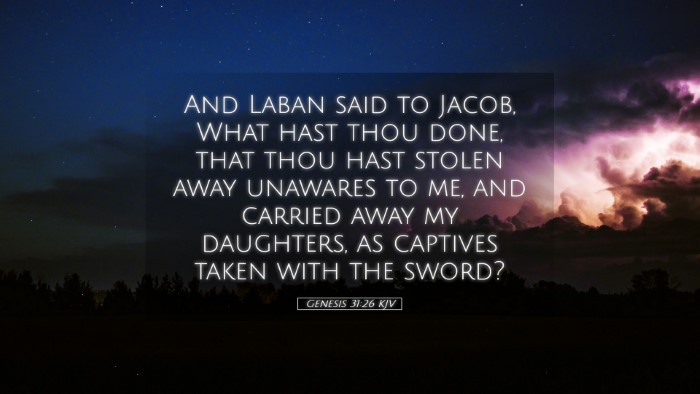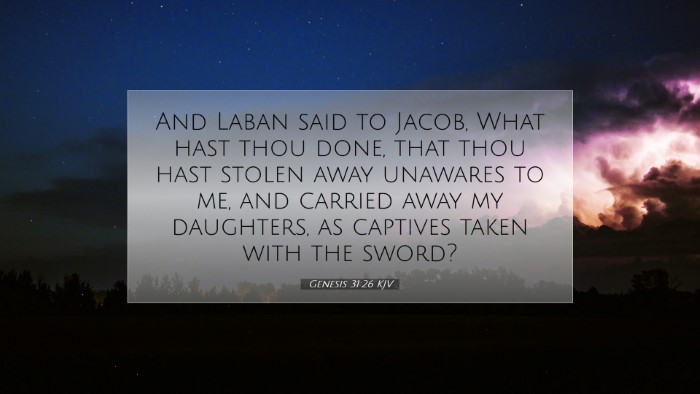Commentary on Genesis 31:26
Verse: "And Laban said to Jacob, What hast thou done, that thou hast stolen away unawares to me, and carried away my daughters, as captives taken with the sword?" (Genesis 31:26)
Introduction
This verse falls within a critical narrative of Genesis, involving the relationship between Jacob and Laban, Jacob’s father-in-law. The context surrounds Jacob’s departure from Laban's household after years of servitude and the subsequent confrontation initiated by Laban. This commentary synthesizes insights from notable public domain scholars to explore the implications of Laban’s question and the broader themes present in this portion of the Scripture.
Contextual Overview
The story captures a pivotal moment when Jacob, driven by divine instruction and a desire for independence, decides to leave Laban secretly. Laban's outcry not only reflects personal loss but also encapsulates themes such as betrayal, injustice, familial loyalty, and the sovereignty of God. Several scholars provide valuable insights into the dynamics at play.
Laban's Accusation
Matthew Henry's Commentary:
Henry underscores Laban's emotional response, highlighting that his concern is both for his daughters and his possessions. He sees Jacob’s departure as an act of treachery, feeling that he has been wronged after having invested in Jacob and his family. Laban’s use of the phrase “stolen away unawares” illustrates his view of Jacob's departure as deceitful. This reveals Laban's misunderstanding of Jacob’s intentions and the order of God that prompted such a departure.
Albert Barnes' Notes:
Barnes explains that Laban’s words indicate a profound sense of betrayal and conflict arising from Jacob's actions. He emphasizes that Laban's lamentation reveals a sense of loss, as his family was not only taken but taken without his knowledge, thus intensifying his feelings of being undermined. Barnes posits that such feelings are common in contentious family dynamics and can lead to significant strife.
Adam Clarke's Commentary:
Clarke elaborates on the emotional tones in Laban’s question, noting it as indicative of a deeper relational grievance. He suggests that Laban viewed Jacob’s departure as akin to a kidnapping, which serves to highlight the seriousness of the cultural and familial ties that were broken. Clarke also draws attention to the implications of Jacob's actions as revealing a transition in God's plan and the unwillingness of Laban to relinquish control over his family.
Thematic Elements
- Betrayal and Loyalty: The tension between familial loyalty and personal ambition is a recurring theme in Genesis. Jacob's departure indicates a pivotal moment of claiming his identity apart from Laban’s influence.
- Divine Sovereignty: The narrative emphasizes God’s hand in guiding Jacob’s journey. Early in the chapter, God instructed Jacob to return to his homeland, setting the stage for this moment of conflict.
- Family Dynamics: The complexities of Laban's relationship with Jacob reflect the broader themes of family tension, cultural obligations, and the struggle for power and recognition.
Application for Today
This verse invites reflection on the nature of relationships, especially within familial and spiritual contexts. Pastors and scholars can draw essential lessons about communication, the handling of grievances, and understanding God's direction in the face of complex personal dynamics.
Matthew Henry's Insights: Henry reminds us that such encounters should be met with humility and grace, emphasizing the importance of seeking reconciliation over conflict.
Albert Barnes' Perspective: Barnes encourages readers to recognize that, like Jacob, individuals may find themselves in situations requiring difficult decisions, yet these must align with divine guidance.
Adam Clarke's Takeaway: Clarke suggests that while relationships may suffer tension and heartache, God’s providence can lead to eventual restoration. This sets a foundation for grace-oriented interactions even amidst difficulty.
Conclusion
Genesis 31:26 serves as both a historical moment and a timeless lesson in human relations and divine guidance. The dialogue between Laban and Jacob reveals not just their personal sentiments but also invites readers to consider the ramifications of our actions and the necessity of aligning our paths with God’s intentions. Each scholar's interpretation provides layers of meaning that enrich the text's understanding, making it relevant for modern audiences navigating the complexities of relationships today.


